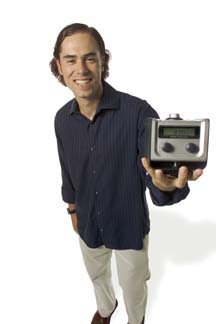Get me to the class on time: Student's idea does just that
By Linda Myers

Adam Hocherman, a second-year MBA student at Cornell University's Johnson Graduate School of Management, had a little idea that has had big press coverage and healthy sales -- not to mention better class attendance on campuses around the world.
The Neverlate 7-Day Alarm Clock was featured on CBS's "Early Show" as "the perfect off-to-college gift" and has won praise in the New York Times' Circuits section as well as in magazines and newspapers in Europe and Asia.
With seven independent alarms, one for each day of the week, the tableside clock radio can be set just once a semester for a student's entire schedule -- 9 a.m. classes on Monday, Wednesday and Friday, a late lab on Tuesday, no classes on Thursday. Changes, such as a canceled class, are easily accommodated without having to reprogram the entire setup.
The feature that Hocherman is proudest of is a simple but revolutionary "nested rotary control" that he invented and is patenting. The easy-to-use rotary-style dials for the clock's various settings replace traditional push buttons. In addition to visual prompts for date and time, there is a unique, "customizable snooze" feature, allowing reprieves of 1 to 30 minutes for students who aren't quite ready to rise, he says. Other features that can be customized are a power nap timer (a student favorite) and a sleep timer.
The Neverlate clock can be purchased at such stores as Linens-n-Things, the Cornell Store, other college bookstores and via online venues, including the Web site of Hocherman's company, American Innovative: http://www.americaninnovative.com. The suggested retail price is $35.
Hocherman, who manages to run his business between classes at the Johnson School using "really good time management" skills, says the idea for the clock came to him as a Cornell undergraduate (he earned a B.S. degree in mechanical engineering in 1997). The motivation to actually develop it didn't arrive until years later, however, when he tried to purchase a clock radio for a girlfriend as a holiday gift: "I stood in the store marveling at how unattractive and difficult to use the products for sale were and thinking to myself, 'I can do better.'" After researching patents and discovering that clock radios hadn't been substantially improved in nearly 20 years, Hocherman was off and running.
American Innovative's logo -- an abstraction of the Wright brothers' Flyer against a setting sun -- was chosen because "it captures the entrepreneurial spirit of American inventors," Hocherman says. A Small Business Administration loan got the company and the Neverlate clock off the ground in 2003, coinciding -- coincidentally -- with the 100th anniversary of the Wrights' historic first flight at Kitty Hawk, N.C.
An industrial designer helped him fine-tune the 5-inch-square clock's appearance, which is, in Hocherman's words, "retro but modern, with a clean look and a small footprint." Under the casing is a software interface that can easily accommodate future changes, such as more customized features.
Before going small as president of American Innovative, Hocherman started his career as a consultant at Andersen Consulting, then moved on to become vice president for engineering at Syncline, a geographic information systems software company in Boston. While those experiences were extremely valuable, working within a large corporation and with the amorphous software industry were not for him. "I wanted to do something more tangible," he says.
He worked to design a business plan for the Neverlate clock that was "simple … something I could get my arms around and be able to say, 'I need so many dollars to build this product, and here's how I'm going to do it.'"
So far, 30,000 Neverlate clocks have been sold to retailers. The dollar projections have been right on the money, and Hocherman owns 100 percent of his profitable company. But to continue to grow it "organically," he says, rather than go public or seek venture capital, means careful research in new product development (the company has two new products on the drawing board) and meticulous production operations.
So why did Hocherman choose to pursue an MBA at the Johnson School in the middle of all that? It helps him run his business better, he says. "There is obviously a lot of synergy. There have been many days when I've learned something in class only to turn it around and apply it to the operation of my company that very night."
One perk: He got to visit the plant where the Neverlate is made, while taking part in a winter intersession course involving a visit to China. "It's a very entrepreneurial operation, like American Innovative," he says.
Media Contact
Get Cornell news delivered right to your inbox.
Subscribe